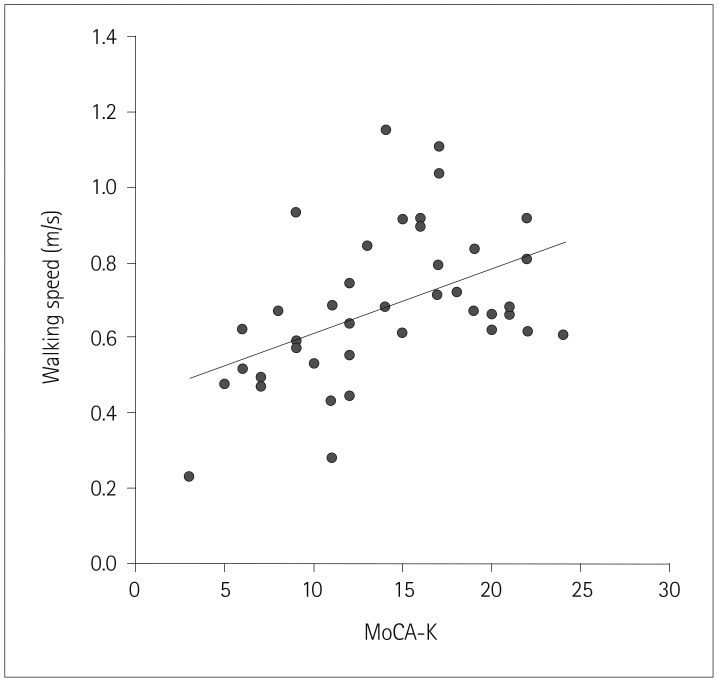J Clin Neurol.
2019 Apr;15(2):152-158. 10.3988/jcn.2019.15.2.152.
The Correlation between Cognition Screening Scores and Gait Status from Three-Dimensional Gait Analysis
- Affiliations
-
- 1Department of Family Medicine, Haeundae Paik Hospital, Busan, Korea.
- 2Department of Neurology, Haeundae Paik Hospital, Busan, Korea. jinsepark@gmail.com
- 3Department of Neurology, Gangneung Asan Hospital, University of Ulsan College of Medicine, Gangneung, Korea.
- 4Department of Neurology, Samsung Medical Center, College of Medicine Sungkyunkwan University, Seoul, Korea.
- 5Department of Neurology, Chungnam National University Hospital, Daejeon, Korea.
- KMID: 2467728
- DOI: http://doi.org/10.3988/jcn.2019.15.2.152
Abstract
- BACKGROUND AND PURPOSE
Gait impairment in patients with cognitive decline has received considerable attention over the past several decades. However, gait disturbance in dementia is often underdiagnosed. The Mini Mental State Examination (MMSE) is the most widely used screening test for dementia, and the Montreal Cognitive Assessment (MoCA) has been developed for more accurate assessments of mild cognitive impairment (MCI). The purpose of this study was to determine the correlation between gait status and the scores on these screening tests for dementia.
METHODS
We recruited 18 patients with MCI and 19 patients with early-stage dementia. All of the participants were examined using the Korean versions of the MMSE and MoCA developed for screening dementia (MMSE-DS and MoCA-K, respectively) and a neuropsychological test to determine cognitive function. A three-dimensional motion-capture system was used to perform objective measurements of gait in all participants. We evaluated the correlation between the screening scores and gait parameters.
RESULTS
The MoCA-K score was significantly correlated with the walking speed (r=0.408, p<0.05) and stride length (r=0.334, p<0.05). After adjusting for age, the MoCA-K score remained correlated with the walking speed (r=0.331, p<0.05), whereas the MMSE-DS score (r=0.264, p=0.11) and stride length (r=0.206, p=0.22) were not. The neuropsychological test revealed that walking speed and stride length were significantly correlated with memory and frontal lobe function.
CONCLUSIONS
We found that the MoCA-K reflects the gait status in patients with cognitive decline more accurately than does the MMSE-DS. Our results suggest that the MoCA-K has more advantages than the MMSE-DS as a screening tool for dementia.
Keyword
MeSH Terms
Figure
Reference
-
1. Kukull WA, Higdon R, Bowen JD, McCormick WC, Teri L, Schellenberg GD, et al. Dementia and Alzheimer disease incidence: a prospective cohort study. Arch Neurol. 2002; 59:1737–1746. PMID: 12433261.2. Plassman BL, Langa KM, Fisher GG, Heeringa SG, Weir DR, Ofstedal MB, et al. Prevalence of cognitive impairment without dementia in the United States. Ann Intern Med. 2008; 148:427–434. PMID: 18347351.
Article3. Dubois B, Albert ML. Amnestic MCI or prodromal Alzheimer's disease? Lancet Neurol. 2004; 3:246–248. PMID: 15039037.
Article4. Folstein MF, Folstein SE, McHugh PR. “Mini-mental state.” A practical method for grading the cognitive state of patients for the clinician. J Psychiatr Res. 1975; 12:189–198. PMID: 1202204.5. Nelson A, Fogel BS, Faust D. Bedside cognitive screening instruments. A critical assessment. J Nerv Ment Dis. 1986; 174:73–83. PMID: 3944597.6. Uhlmann RF, Larson EB. Effect of education on the mini-mental state examination as a screening test for dementia. J Am Geriatr Soc. 1991; 39:876–880. PMID: 1885862.
Article7. Nasreddine ZS, Phillips NA, Bédirian V, Charbonneau S, Whitehead V, Collin I, et al. The Montreal Cognitive Assessment, MoCA: a brief screening tool for mild cognitive impairment. J Am Geriatr Soc. 2005; 53:695–699. PMID: 15817019.
Article8. Verghese J, LeValley A, Hall CB, Katz MJ, Ambrose AF, Lipton RB. Epidemiology of gait disorders in community-residing older adults. J Am Geriatr Soc. 2006; 54:255–261. PMID: 16460376.
Article9. Montero-Odasso M, Verghese J, Beauchet O, Hausdorff JM. Gait and cognition: a complementary approach to understanding brain function and the risk of falling. J Am Geriatr Soc. 2012; 60:2127–2136. PMID: 23110433.
Article10. Mielke MM, Roberts RO, Savica R, Cha R, Drubach DI, Christianson T, et al. Assessing the temporal relationship between cognition and gait: slow gait predicts cognitive decline in the Mayo Clinic Study of Aging. J Gerontol A Biol Sci Med Sci. 2013; 68:929–937. PMID: 23250002.
Article11. Savica R, Wennberg AM, Hagen C, Edwards K, Roberts RO, Hollman JH, et al. Comparison of gait parameters for predicting cognitive decline: the Mayo Clinic Study of Aging. J Alzheimers Dis. 2017; 55:559–567. PMID: 27662317.12. Ble A, Volpato S, Zuliani G, Guralnik JM, Bandinelli S, Lauretani F, et al. Executive function correlates with walking speed in older persons: the InCHIANTI study. J Am Geriatr Soc. 2005; 53:410–415. PMID: 15743282.
Article13. Verghese J, Wang C, Lipton RB, Holtzer R, Xue X. Quantitative gait dysfunction and risk of cognitive decline and dementia. J Neurol Neurosurg Psychiatry. 2007; 78:929–935. PMID: 17237140.
Article14. Alvarez JA, Emory E. Executive function and the frontal lobes: a meta-analytic review. Neuropsychol Rev. 2006; 16:17–42. PMID: 16794878.
Article15. Shin HW, Chung SJ. Drug-induced parkinsonism. J Clin Neurol. 2012; 8:15–21. PMID: 22523509.
Article16. Albert MS, DeKosky ST, Dickson D, Dubois B, Feldman HH, Fox NC, et al. The diagnosis of mild cognitive impairment due to Alzheimer's disease: recommendations from the National Institute on Aging-Alzheimer's Association workgroups on diagnostic guidelines for Alzheimer's disease. Alzheimers Dement. 2011; 7:270–279. PMID: 21514249.
Article17. McKhann GM, Knopman DS, Chertkow H, Hyman BT, Jack CR Jr, Kawas CH, et al. The diagnosis of dementia due to Alzheimer's disease: recommendations from the National Institute on Aging-Alzheimer's Association workgroups on diagnostic guidelines for Alzheimer's disease. Alzheimers Dement. 2011; 7:263–269. PMID: 21514250.
Article18. Meldrum D, Shouldice C, Conroy R, Jones K, Forward M. Test-retest reliability of three dimensional gait analysis: including a novel approach to visualising agreement of gait cycle waveforms with Bland and Altman plots. Gait Posture. 2014; 39:265–271. PMID: 24139682.
Article19. Hollman JH, McDade EM, Petersen RC. Normative spatiotemporal gait parameters in older adults. Gait Posture. 2011; 34:111–118. PMID: 21531139.
Article20. Lima LC, Ansai JH, Andrade LP, Takahashi AC. The relationship between dual-task and cognitive performance among elderly participants who exercise regularly. Braz J Phys Ther. 2015; 19:159–166. PMID: 25993629.
Article21. Chen S, Honda T, Narazaki K, Chen T, Nofuji Y, Kumagai S. Global cognitive performance and frailty in non-demented community-dwelling older adults: findings from the Sasaguri Genkimon Study. Geriatr Gerontol Int. 2016; 16:729–736. PMID: 26082148.
Article


